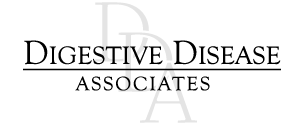Ulcerative colitis is a chronic disease of the large intestine, also known as the colon, in which the lining of the colon becomes inflamed and develops sores (ulcers) that produce pus and mucous. Ulcerative colitis is limited to the colon and the rectum.
As ulcerative colitis is a chronic condition, patients will likely have periods of disease inactivity. When the disease is active, however, typical symptoms may include:
- Abdominal pain
- Diarrhea mixed with blood or pus
- Urgent need to defecate
- Pain with defecation
- Fatigue
- Nausea or loss of appetite
- Weight loss
- Fever
- Anemia
Less common symptoms include:
- Joint pain
- Eye irritation
- Rashes
- Liver problems

Treatment
At present the only cure for ulcerative colitis is a total colectomy. It is recommended that patients receive appropriate care as long-term ulcerative colitis is a risk factor for colon cancer.
The treatment approaches recommended by the gastroenterology experts at Digestive Disease Associates may include:
- Over the counter medications to reduce diarrhea
- Prescription medications—anti-inflammatory drugs or immune system suppressors
- Lifestyle changes (for example, limit or avoid greasy and fried foods, high-fiber foods, alcohol, caffeine, and nuts; drink plenty of water; eat small amounts of food throughout the day)
If patients fail to obtain relief from medications, surgery to remove the colon (and perhaps the rectum) may be required. Common procedures include:
- Ileal Pouch-Anal Anastomosis (the surgeon creates a new rectum from the small intestines, thus eliminating the need for an ostomy bag)
- Total Proctocolectomy with Ileostomy (complete removal of the large intestine, including colon, rectum, and anus). An incision is made in the lower right belly and the end of the small intestine is then sewn onto the patient’s belly. This opening—known as a stoma—will be the exit for stools.
- Colectomy (surgeon removes the diseases portion of the colon, while the remaining part may be re-connected if sufficiently healthy)
Note: This information shouldn’t take the place of a physician’s care. Please see your physician or Dr. Kaur of the Digestive Disease Associates of Hinsdale, IL with any questions or concerns: (630) 325-4255.
